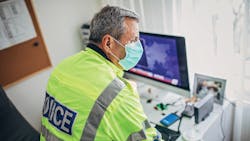Any recommendations or advice written here are not intended to guarantee protection. Officer Media Group strongly suggests following any guidelines from the CDC and follow manufacturer’s guidelines on cleaning your uniform and equipment.
A cough. A sneeze. A handshake. A fight with a combative suspect. While any interaction nowadays (be it accidental or not) isn’t stopping any law enforcement officer from doing their job, COVID-19 just adds to the list of possible known dangers involved. Police work doesn’t always have the luxury of adhering to “social distancing.”
Where there will always be the invisible threats of substances like fentanyl, harmful viruses, bacteria, and other dangerous chemical compounds, there also will be the need to keep those threats away from home. The traditional response would be to wear personal protective equipment whenever possible. Unfortunately, if you don’t have them on already, suspects won’t be so polite to let you pop on some non-latex, powder-free gloves before they commit a crime or become resistant. PPE can protect a lot, but the shirt, the hat, the body armor vest, boots, and any duty gear aren’t covered by the N95 mask.
Some agencies have already integrated some changes to handle this. According to an April 8 article by Robert Salonga, a reporter for The Mercury News, the South Bay County Sheriff’s Office (Santa Clara County, Calif.) put together a “tented area and adjacent shower trailer” for decontamination to be used by first responders—police, firefighters or other emergency workers. The article explains the steps the deputies are taking to clean. Utilizing a bleach solution, officers disinfect boots and gear separately and bag up the uniform for washing. This is followed by a shower with a clean change of clothes to go home. Note, be sure about the use of any bleach-based agents as they may cause discoloration or staining.
Taking advantage of the capabilities of the battle dress uniform (BDU), the Los Angeles Police Department, according to LAist.com, in a post on March 23, the LAPD have begun allowing their officers to “wear breathable, cotton uniforms they can wash at home.”
"Regular patrol uniforms are dry-cleaned and can take longer to get back for use," says Officer Drake Madison, Pubic Communications Group, Media Relations Division. "Officers wipe down their patrol cars between watches and are taken out of service if contaminated." The car is then returned to service after decontamination.
Your own agency may have already created their own protocols. But now that your shift is over, and your bag of clothes is waiting for you in the trunk, is there anything special to do to wash the uniform apart from your regular habit?
Special effort
Short answer: yes and no. But don’t take that as a dismal outlook or cause for alarm. Some added careful steps to your uniform cleaning routine should keep you and your equipment safe. Of course, remember to wash your hands.
Anyone searching online for a cleaning product to disinfect or one that is marketed to “kill the COVID-19” virus should be able to find what they’re looking for. True or not, there are products out there. However, double-check the fine print. Steve Klock, a representative of Owyhee Group Companies, says that “most of the products that are being advertised to kill Coronavirus are for non-porous surfaces.” Since the fabric of your uniform and a number of pieces of your duty gear are porous, he suggests selecting cleaning products that have both porous and non-porous characteristics to disinfect your uniform and kit.
“The challenge with COVID-19,” he adds, “is the virus capabilities and modes of transmission aren’t fully known [yet]. Due to high involvement with unknown infected personnel, I recommend changing your uniform daily or if you come in contact with a known/suspected COVID-19 infected person.”
Angela Milligan, Vice President of Marketing of Fechheimer Brothers Co. also recognizes the challenge. Though she wasn’t aware of a product that can be used on apparel to ensure an officer’s safety from coronavirus, there are a few things officers can do:
- Immediately wash garments worn outside or in any publicly exposed environment
- Avoid sitting or lounging in your uniform once you have entered your home
- Rotate through multiple uniform garments through every other day, allowing the possibility of any contamination to die off
- Change garments throughout the day should you believe you were possibly exposed. Keeping multiple shirts and pants to change into might protect from prolonged exposure on any garments
- Bag any possibly contaminated garments separate from other items until you are able to safely wash them
As far as washing your uniform goes, Christopher Brown, Operations Manager for Emergency Cleaning Solutions—a Texas-based crime scene cleaning company, says that typical laundering with detergent should work fine for uniform/fabrics and to follow the laundering instructions regarding the water temperature.
“Make sure you follow product directions on the label for dilution and dwell time,” he says regarding any disinfectant. “Most need a certain amount of time that it must remain moist on the surface to do its job.” Ten minutes is common, but longer may be necessary.
Follow the South Bay County Sheriff’s Office example by isolating your boots and apparel immediately into a disposable bag before entering your home. Act as if you’re contaminated and conduct self-decontamination. Then directly wash everything in you’ve bagged. Klock recommends ensuring the detergent is “COVID-19 capable.”
He adds, “have materials in your vehicle or garage to disinfect those surfaces you touched. The transition from protecting the public to protecting your family and friends requires strict protocols and discipline.”
Various brands of The Safariland Group such as Hatch, Monadnock, Med-Eng, Defense Technology, and more have developed separate cleaning recommendations. Some of the instructions include:
- Visibly dirty surfaces can be cleaned using a detergent or soap and water prior to disinfection
- Duty gear products can be cleaned by wiping with a damp cloth, a liquid or powder soap and water with a scouring pad may help
- Refer to the “Use and Care” for cleaning information on your armor ballistics and carriers
- To not use aerosols, as these may inadvertently leak disinfectant into critical electronic communications components or may negatively affect ballistic material
These recommendations and more can be found online at www.safariland.com/resources.
“All plastics, metal and hard-surfaced items can be disinfected using an EPA-registered virucidal disinfectant,” says Brown. “The EPA has a list of approved disinfectants that are effective against COVID-19. We use Shockwave by Fiberlogic.” Likewise, several brands within The Safariland Group recommend against using bleach-based cleaners and wipes to avoid discoloration or staining of the product.
Mind your small electronics as well. According to Earphone Connection, common disinfectant wipes and rubbing alcohol are safe to use on the plastic surfaces of their products like ear tips, cables and wires. They suggest to apply a small amount of alcohol on a lint-free cloth—damp, not soaking—and rub all over the surface. Be mindful to not submerge your pieces in any cleaning solution.
Also, remember to pay some attention to your patrol car too. Klock recommends treating your patrol car each time a new individual is introduced. If that’s not possible, he suggests that the minimum treatment would be before and after each shift. Be sure to follow product directions and disinfect the steering wheel and other commonly touched surfaces on a daily basis. In his article, Salonga writes that the South Bay County Sheriff’s Office purchased an ozone sterilizer for patrol vehicles as well as a “room sterilizer that uses ultraviolet light to kill pathogens.”
General maintenance
Many apparel manufacturers have been building their pieces to handle daily washing already. David Hein, Vice President, GMM Americas Sales Division, Global Professional Division & Merchandising Operations for 5.11 Inc. explains that they designed their uniforms to hold up to rigorous standards, from Teflon treatment for stain and oil repellency, ultra fade-resistant properties and a UPF 50 rating on most of their uniform shirts and pants. Adding that, “5.11 provides a variety of innovative washable uniform options for law enforcement. The tops, bottoms, packs, footwear and accessories are purpose-built with law enforcement officer’s needs in mind, while also being comfortable and durable enough to withstand the most demanding missions.”
Even without the threat of viral contamination, you’ve likely been already putting them through a regular washing routine. Many modern items available for law enforcement officers are already designed to withstand daily washing. Fechheimer’s Milligan suggests turning your garments inside out to reduce color degradation and extend the life of your garment’s appearance.
A few products that disinfect or detect
To date, there a number of products on the market that are designed to aid the detection of sick individuals, testing a sample for the detection of the virus, and decontaminate. A few include:
- Skin Temperature Screening—Shooter Detection Systems announced a partnership with X.Labs and created a screening technology called Feevr. This artificial intelligence-based thermal imaging system is designed to detect elevated temperatures of individuals in a crowd. Similarly, Seek Thermal, known for their handheld device and smartphone-based thermal imaging products, developed its own thermal-based skin temperature screening system called Seek Scan. Both solutions allow non-contact screening providing a layer of prevention and protection without special equipment.
- Mobile Testing—GreyScan’s TVD-1 Fieldable Trace Detector was designed for ease of use in the field and recently adapted to test for the presence of the SARS-CoV-2 virus, setting it up for additional pathogenic viruses that may arise in the future. The device is rugged and provides results directly on the machine. DetectaChem created a test kit for COVID-19. Officers can use the easy to use sample pouch and obtain test results using the MobileDetect app on a smartphone or tablet.
- Disinfect—On April 2, Owyhee Group Companies partnered with Spectra Shield Technologies to supply the Spectra DF-500 disinfectant, a formulation that was developed from the U.S. government’s recognition of a need to combat bioterrorism. Spectra DF-500 is EPA registered as a decontaminant, disinfectant, virucide, bactericide, fungicide, deodorizer, algaecide, antibacterial, mildewstat, and cleaner. It is a sister product to DF-200, a three-part solution. On the higher-tech side of things, The Criminalistics Laboratory of the Johnson County Sheriff’s Office (Kansas), have begun utilizing their evidence drying cabinets to sanitize masks with an ultraviolet (UV) light. According to Larson Electronics, an industrial lighting company, UV light eliminated viruses like COVID-19 by targeting the DNA of the microbe. After a period of time (which can range depending on the type and strain of virus), damage to the cells of the virus stops replication. The company offers various types of UV options including overhead lights, small device boxes for tablets and mobile devices, sanitation carts, and more.
- Liquid Hand Sanitizer—As far as COVID-19 goes, sanitizers aren’t always your best bet. Unfortunately, according to Klock very few sanitizers are capable of destroying COVID-19. He explains that “sanitizers are only required to destroy staph aureus, E. coloi or salmonella within 30 seconds.”
As you would with any purchase of any product, make sure to do your due diligence, research, and read the label. And, of course, remember to wash your hands.



